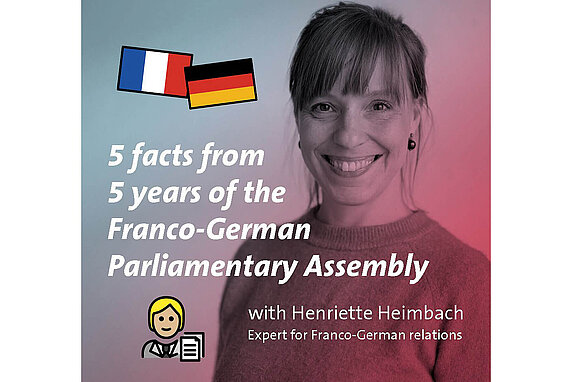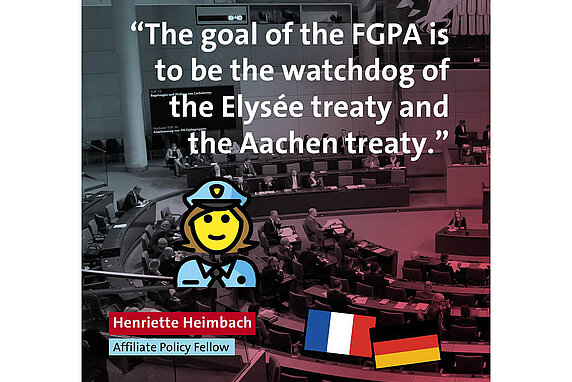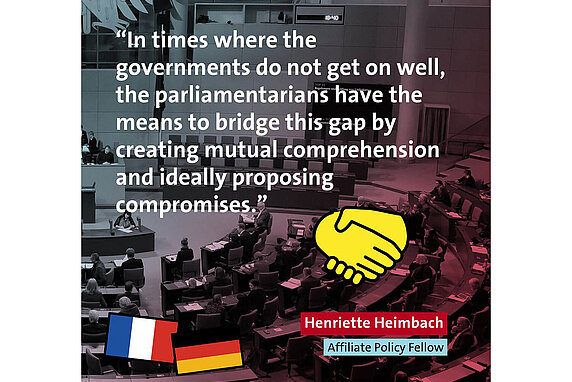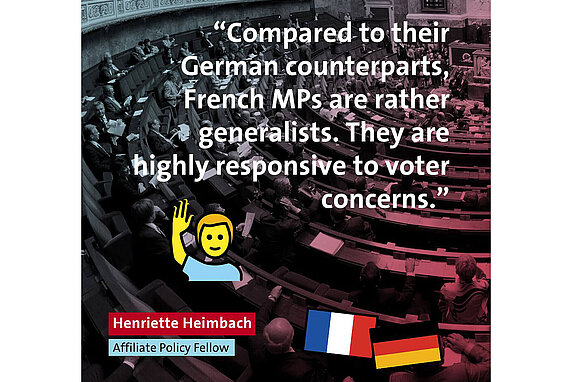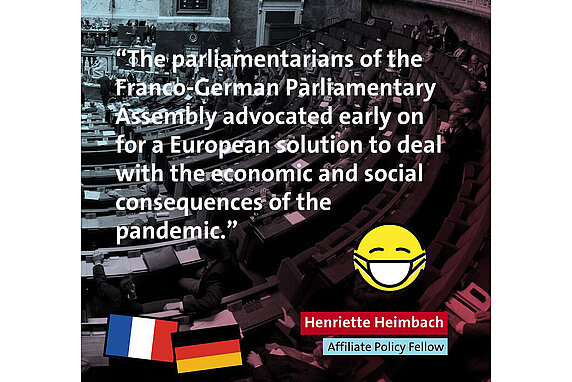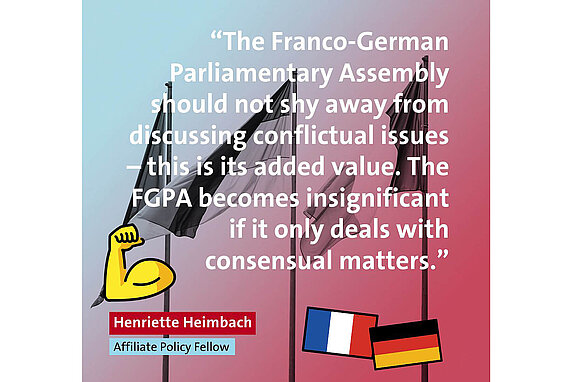
Henriette Heimbach is an Affiliate Policy Fellow and expert on Franco-German relations in Europe. In April, she will publish her new policy brief on the Franco-German Parliamentary Assembly (FGPA), whose first session took place on 25 March 2019. We talked to her about what the German and French parliaments can learn from each other and where the assembly’s work is the most effective.
What was the motivation to initiate the Franco-German Parliamentary Assembly and how does it work?
This young bilateral assembly is a genuine step towards integration in Franco-German relations, which was also one of the motives of the founding actors. In 2017, a group of French and German parliamentarians said: We want to deepen Franco-German cooperation and add a strong parliamentary link to it. In the past, the relations were dominated by the governments.
These MPs engaged in a bilateral working group in 2018 and negotiated a parliamentary agreement with the FGPA at its heart. Nowadays, this new parliamentary body brings together 100 members of parliament, 50 from the German Bundestag and 50 from the French Assemblée nationale. They meet at least twice a year to exchange views and debate Franco-German and European issues. The goal of the FGPA is to be the watchdog of the Elysée treaty and the Aachen treaty. Moreover, it wants to bring together German and French positions at European level in order to strengthen European integration.
After five years and 13 sessions, what role has the FGPA adopted – is it more of a symbol, or a diplomatic driver?
The FGPA is still a quite young parliamentary body. However, some trends can be identified: It became an important forum for exchange between parliamentarians from both countries. With 100 members, it is quite a large group of politicians that meet regularly. Consequently, these people learned a lot about the political system and culture of the other country. Most importantly, they could develop an understanding for differences and similarities of political positions. This is a basis for finding common solutions to conflictual issues between France and Germany.
In times where the governments do not get on well, the parliamentarians have the means to bridge this gap by creating mutual comprehension and ideally proposing compromises. However, the FGPAs influence is also limited, as it cannot take legally binding decisions and the relationship between the parliament and the executive is very different in France and Germany.
How have the two parliaments influenced each other in the past five years?
The German Bundestag and the French Assemblée nationale differ largely in their role and function in the national system. The Bundestag is a powerful parliament that acts independently and has a say in many policy fields. It can even decide on military missions. German MPs understand themselves first and foremost as legislative controllers and experts of the committee to which they belong.
On the other side the powers of the Assemblée nationale are restricted by the constitution due to historic reasons (e.g. parliamentary instabilities in the Third and Fourth Republic). The French parliament for example is bound to specific policy fields. External relations are in the realm of the French president’s competencies and the parliament is not supposed to interfere. Compared to their German counterparts, French MPs are rather generalists. They are highly responsive to voter concerns and engage in interest mediation and representation. Because of these differences, parliamentary cooperation is a challenge, but also an enriching experience for the MPs.
What outcome from the sessions of the FGPA do you regard as the most noticeable?
The management of the Covid-19 pandemic in France and Germany is a good example for how effective the FGPA can be. During the sanitary crisis in 2020 and 2021, the FGPA realised several extraordinary sessions in order to keep track with the developments. It invited the French and German interior ministers to a hearing in May 2020, in the middle of the pandemic. Under pressure from the parliamentarians, the ministers agreed to partially lift controls on the Franco-German border that had caused resentment in the cross-border region.
This means that it successfully channelled discontent in the border region and brought about a ministerial agreement. Similarly, the parliamentarians advocated early on for a European solution to deal with the economic and social consequences of the pandemic. They closely followed and supported Franco-German rapprochement that led to the bilateral initiative for a European recovery fund in May 2020 by issuing declarations and hearing the minister of economy during the EU decision-making process.
How will the role of the FGPA develop in the next five years?
The further development of the FGPA depends on several factors. First, the assembly is now established – it is difficult to abolish an institution again, as it creates its own dynamic. However, the FGPA lives from the commitment of its members and the recognition by the governments. Political will and political personalities are a decisive factor for whether the assembly bumbles along or can provide impetus for Franco-German relations.
Second, the governmental hearings should be continued because they create visibility for the parliamentary body and force the ministers to deal with the Franco-German dimension of their work. Third, the FGPA should not shy away from discussing conflictual issues – this is its added value.The FGPA becomes insignificant if it only deals with consensual matters. An innovative project would be to discuss a common legislative proposal, such as the coherent transposition of an EU directive into French and German law. There is much potential for this unique parliamentary body.
For Instagram, we created five fact slides on the Franco-German Parliamentary Assembly. Follow us for more insights from European politics.

